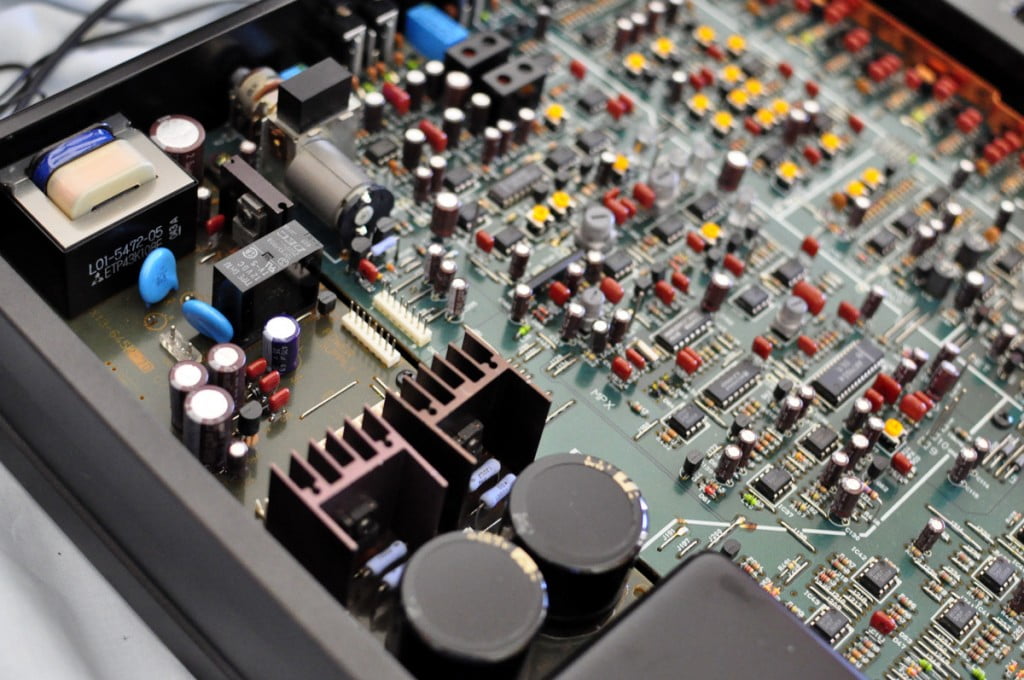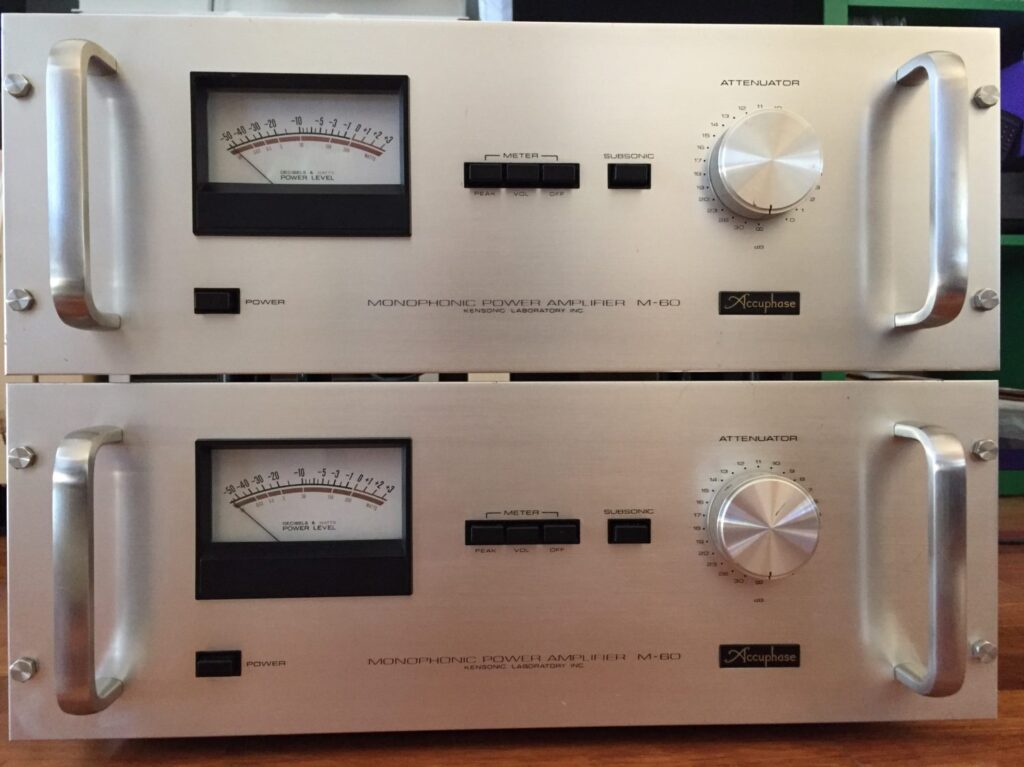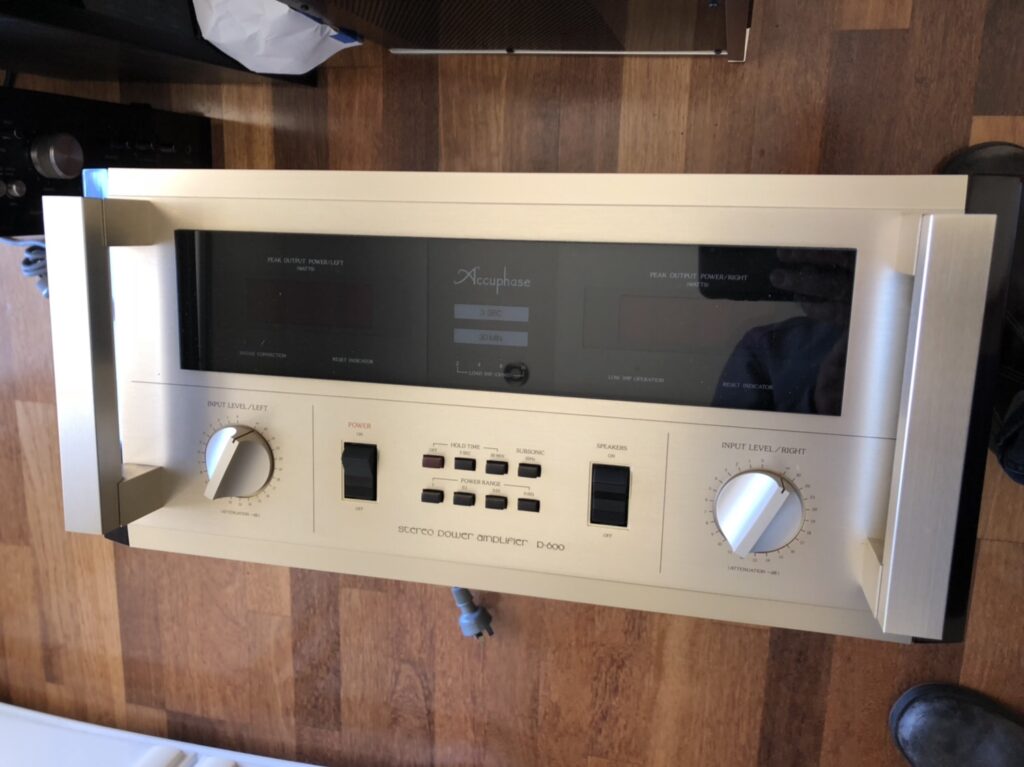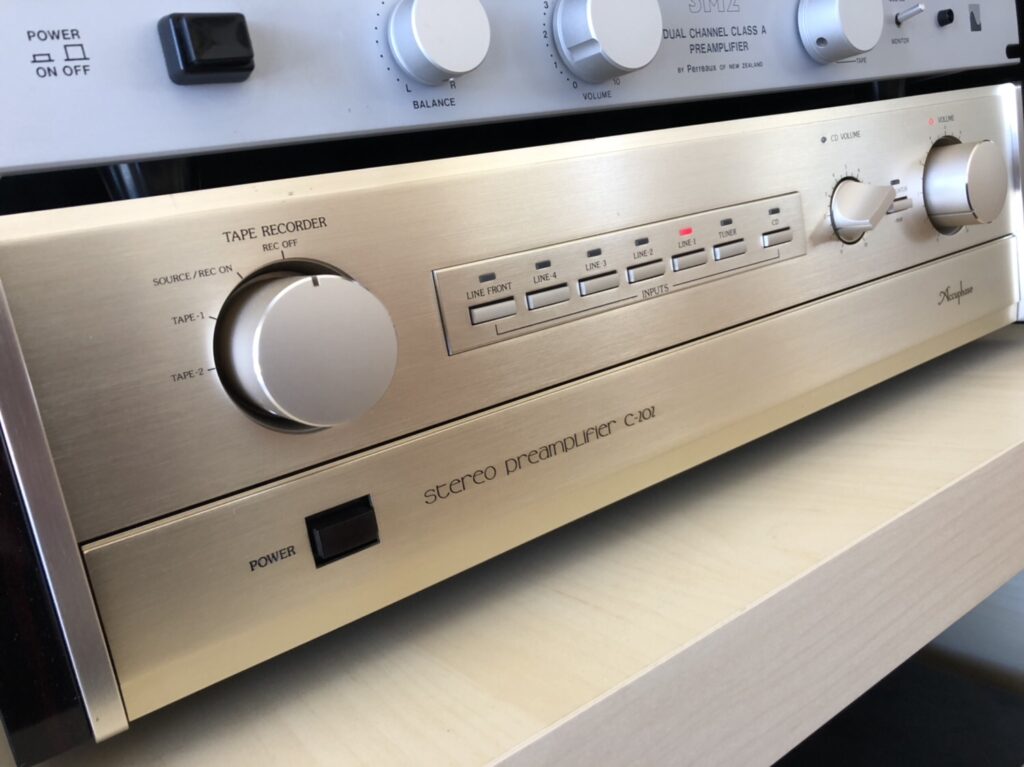In this article, I look at a locally sold, bodged Accuphase P-300 power amplifier and how I got her running properly again.
The Accuphase P-300 power amplifier is one of the most beautiful solid-state power amplifiers from the 1970s and one of the nicest sounding. This one came to me with some serious issues and a very unhappy new owner.
It was sold here in Perth, earlier in 2020. The seller had tried and failed to repair various issues. How do we know this? Well, he told the buyer that he had personally repaired the amplifier! Nothing but the facts here at Liquid Audio folks.
Let’s take a closer look at what went wrong here and how it could have been avoided.
UPDATE: Several other of my customers have contacted me since publishing this article. They told me that they also went and looked at this P-300 and that they also found something wasn’t right. Read on to find out why!

Hi and my apologies for the lack of articles. To say I’ve been busy is understating it but that’s not a good enough excuse. Anyway, I’ll try to maintain the writing momentum! I didn’t take enough photos of this old girl, so I strongly suggest you view the companion video over on my YouTube channel:
Specifications
Courtesy of HiFi Engine
Power output: 150 watts per channel into 8Ω (stereo)
Frequency response: 20Hz to 20kHz
Total harmonic distortion: 0.1%
Damping factor: 60
Input sensitivity: 1V
Signal to noise ratio: 100dB
Speaker load impedance: 4Ω to 16Ω
Semiconductors: 73 x transistors, 1 x IC, 2 x thermistors
Dimensions: 445 x 152 x 355mm
Weight: 25kg
Features
The beautiful Accuphase P-300 power amplifier was, and remains, a superb hi-fi amplifier. I won’t go into too much detail as I want to keep this mostly about the problems with this particular unit, but if you are looking for a super well-built, powerful and amazing-sounding amplifier, the Accuphase P-300 should definitely be on your shortlist.
The P-300 is a stereo power amplifier with added functionality allowing its use as a two-source line-level system. The twin attenuators and front panel RCA inputs give great flexibility and allow the P-300 to form the basis of an awesome sounding no-preamp, line-level only setup.
There P-300 also has a great-sounding headphone socket, filters, twin analog power/VU meters, multi-voltage capability and superb build and sound quality. These features combine to make this a great long-term prospect if you’re looking for that sort of thing.
Accuphase has more information about the P-300 over on their website.
Dodgy Sellers and Pre-Purchase Inspections
Someone commented over on the Liquid Audio Facebook that I don’t know the seller created these problems. Well, actually I do, or I wouldn’t have said so. As I mentioned previously, he told my customer he did the work, said he was an ‘expert’ and repaired it himself! Talk about a smoking gun. For the record and if you hadn’t already realised, I’m only interested in the truth. If I’ve stated something as fact, you can be sure it is.
Anyway, shortly after purchase, my customer realised something wasn’t right with her new Accuphase P-300. Fed with a strong signal and with everything turned up to the max, the volume through headphones and speakers was so low as to be effectively useless. She’d trusted this seller, but lurking inside was some really dodgy work.
My customer went back to this guy but he hung up on her and then reported her to the police! That’s right, he reported her to the police! Can you believe the gall of some people?! She took her P-300 to one of the last specialist hi-fi retailers in Perth who confirmed the problem and referred her to me.
I won’t mention the seller’s name, but he is an older European man, probably German, and not someone you want to deal with based on what my customer told me. Be warned, he sounds particularly nasty and shady to boot, and he sells a lot of hi-fi equipment here in Perth, on Gumtree.
If you are in any doubt about pre-owned equipment you are considering purchasing, get a pre-purchase inspection. I inspect hi-fi equipment and save my customers money, pain and the regret they might otherwise feel after purchasing equipment with problems.
Yes, this means spending a little money, but seriously, this is a multi-thousand dollar amplifier potentially. If my customer had brought this to me before buying it, she could have taken my report to the seller and asked for rectification, a big discount or passed on the sale.
Issues with this Accuphase P-300:
- Very low gain and resultant low output power
- Broken front panel RCA input and filter switches
- Bodged wiring attempt to bypass broken front panel switches
- Quiescent current and DC symmetry way out of adjustment
Alright, so let’s get started. After testing, I dug in and found issues with the little black rotary switches under the front panel. Because I’ve been focused on repairs rather than writing, I didn’t get as many images as I would have liked, so watch the video which contains much more.






Repairs
The first thing I did is to repair the signal path by rejoining the left and right signal wiring from the rear RCA connectors to the attenuators and fixing the floating/joined signal return issues.


This repair revealed one significant residual issue though. The front panel filter switch (also under the black flap) was also broken because it too had been forced. Even though the signal now comes to the filter switch, as it is meant to, it stops there, because the switch contacts are broken. This is the real issue that the previous owner couldn’t fix.
I studied the schematic and worked out how to bypass the filter switch in a way that maintains signal integrity and probably improves performance. I installed links bypassing this broken switch, tested the amplifier and found that it now worked perfectly.

Final Adjustments
So, with signal integrity, attenuators and the correct gain and performance restored, I focussed on some adjustments. This amplifier was supposedly worked on previously by an expert, but there were issues here too.
The quiescent current (bias current) adjustments were out, nearly twice what they should be in one channel. I rectified that and the DC asymmetry that resulted in around 200mV of DC at the speaker terminals. These changes alone will significantly improve performance.


To Repair or Replace..?
“Mike, should I repair my old Accuphase P-300 or just replace it with a new power amplifier?”
The answer really depends on how much you value the sound, engineering and classic hi-fi goodness you get with a beast like this.
To replace an amplifier like the P-300 you’d need to drop around $14K AUD on an Accuphase P-4500, or $13K AUD on a Yamaha M-5000. The M-5000 certainly looks pretty and I’ll bet it sounds good. The P-4500 looks even better, weighs more, but neither is as powerful as the P-300 and you’ll be very surprised at just how good a well-sorted P-300 sounds.
You’ll pick up a P-300 for anywhere from $1500 – $2500 AUD, depending on condition, service history and so on. Sure, you’ll need to spend some money having it overhauled or restored, but you’ll still be miles ahead price-wise and I suspect the P-300 will be more collectible.

Final Words
This Accuphase P-300 now looks as good as it sounds and I’m happy to say that the repair was very affordable. The new owner is happy, but it’s worth noting that her pain could have been avoided, had the seller simply recognised he couldn’t repair the amplifier and taken it to someone who could. He could then have sold it with a clear conscience.
Cases like this often end up in the Hall of Shame. People working on electronics either fail to recognise their limitations and ask for help or worse still, deliberately behave maliciously.
A final word to the seller. If you are reading this and feel victimised, don’t. Remember, you caused this problem, your actions and lack of ethics are to blame. You tried to comment on my YouTube video, which also failed. Maybe try doing something else..?


As always, thanks for visiting. If you’d like me to look at your Accuphase P-300 or any other amplifier for that matter, please get in touch!
Discover more from LiQUiD AUDiO
Subscribe to get the latest posts sent to your email.








